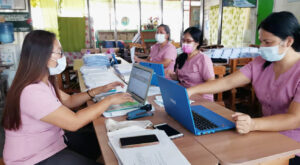THE PHILIPPINE Business for Education (PBEd) on Wednesday called on the Senate to pass measures to boost teacher performance in licensure exams as the country tries to address gaps in the education sector.
“If we want our students to do better, we need better teachers with enough experience and knowledge in their subject areas,” PBEd Executive Director Justine B. Raagas said in a statement.
“The current teacher licensure process does not adequately reflect the diverse qualifications and experiences of educators, limiting the potential for high-quality instruction.”
Lawmakers have been pushing for measures that aim to provide multiple pathways to license teachers through portfolios, refresher course requirements, and a more effective licensure system that would recognize practical qualifications and experience.
Senate Bills Nos. 2830 and 2840 particularly sought to amend the Philippine Teachers Professionalization Act of 1994 by introducing non-examination methods to register as professional teachers. Both bills remain pending at the committee level.
Senator Sherwin T. Gatchalian, who heads the basic education committee, said the government must come up with a roadmap that ensures public school teachers are well-equipped to teach basic subjects
He said about 62% of high school teachers are assigned to teach subjects they did not major in, citing data from the Second Congressional Commission on Education.
Ms. Raagas said in the statement that the current licensing process for teachers does not take in to account individuals with relevant industry experience who want to enter the teaching workforce.
“The failure to update the licensure exams and requirements may have contributed to a gap in the quality and relevance of education offered in these specialized tracks, which could explain the skills mismatch observed among our graduates in the job market,” she said.
The Department of Education has said it is looking to hire about 26,000 teachers next year to close the gap in the country’s shortage of 46,000 educators to service 43,000 schools nationwide.
Its proposed P793.177-billion budget next year has an allocation of P3.43 billion to hire employees for nonteaching positions which would ease the administrative load for teachers.
Filipino students were still among the world’s weakest in math, reading, and science, according to the 2022 Program for International Student Assessment, with the Philippines ranking 77th out of 81 countries and performing worse than the global average in all categories.
Under the same report, the Organization for Economic Cooperation and Development said 15-year-old Filipino students also ranked 63rd out of 64 countries in terms of creative thinking.
“Given the evolving needs of our teachers and students, we require these reforms to ensure that our education system is responsive, effective, and capable of preparing both educators and learners for the challenges of the future,” PBEd’s Ms. Raagas said. — John Victor D. Ordoñez

















